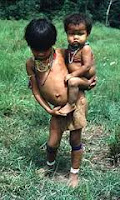

The Continuum Concept was the first book I read in relation to child rearing while I was pregnant and I still consider it one of the best I've come across. This book is written by Jane Liedloff, an American writer, who lived for two and a half years with theYequana tribe, deep in the Amazon Forrest. The Continuum Concept opened my eyes to a whole new way of thinking about babies and children. The Yequana women give birth and keep their babies with them, in arms, until the baby can crawl. Once the baby can crawl the baby spends much time crawling near by while the mother does tasks and goes about her normal day. When the baby can walk, he or she will be playing with all the other children in the tribe essentially being raised by them until the baby needs comfort or nourishment from the mother. The mother does not coddle the baby at all, but at the same time she is there whenever the child cries for her or wants her comfort, or maybe some breastmilk. From birth the child has a place in the tribe and is expected to learn, adapt, and survive, just as all other mammals do. Little toddlers boys are running around with bow and arrows practicing to be just like the adult males in their tribe without injuring each other. Little girls are mimicking the work that the women do. There are no cribs, playpens, forced naps, or plastic toys from China used, ever! The children literally never go through the terrible two stage. They do not have tantrums like we see in our industrialized culture. The adults grow up to be drama free and are happy to work and participate for the well being of their tribe. The biggest difference in our cultures in how we respond to our young is that the Yequana do not push independence on their young. They hold their babies all the time for the first six months or so. They sleep with their babies regularly. There are always children of different ages around who can keep up with the energy and imagination of whatever stage a child may be going through. Once a child grows interested in adult responsibilities or activities, the child is welcomed to advance into that area of subject. There are no kid specific toys or games, no age requirements or limits. The child is a fully respected member of the tribe as soon as they are born and treated as such. Here in America, we bombard our children with special gadgets, gismos and toys to entertain them. We push them away from "adult" activities and children are separated from adult life in general. There is child centered activities and non child activities. Most of the time the child is waiting to be allowed to experience the next "child-centered" activity and are usually forced to be with children their own age, like during school. This causes major frustration for them and studies show that the independence we are pushing, before a child is ready, is actually causing a more insecure adults later in life. The Yequana people are living the same way our ancestors lived thousands of years ago. They still possess something our culture certainly has lost. We can learn a lot from the Yequana people.


No comments:
Post a Comment